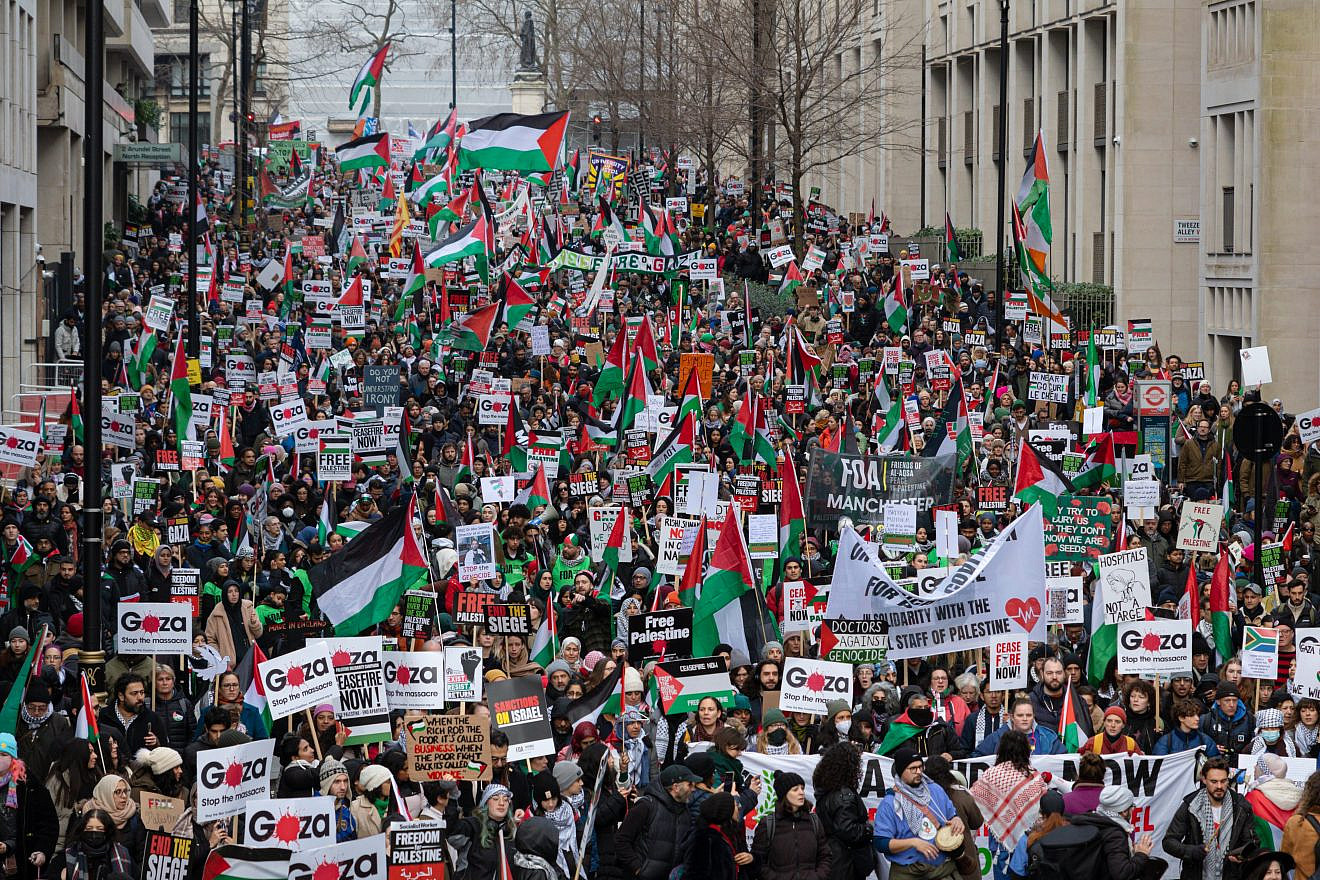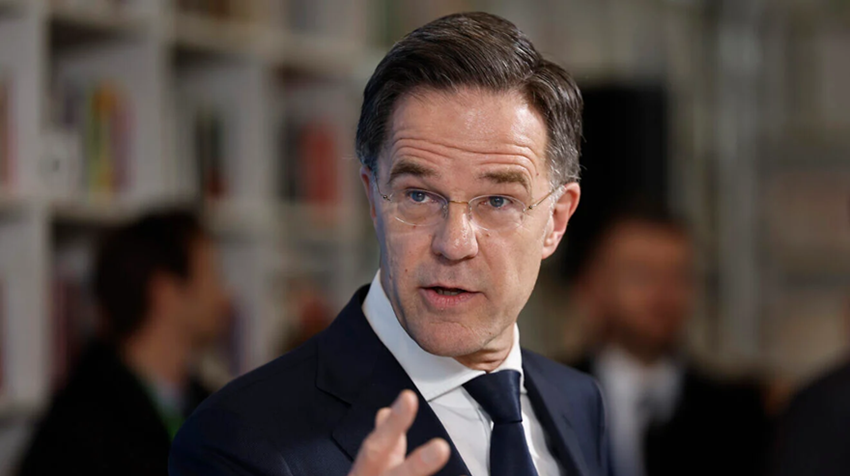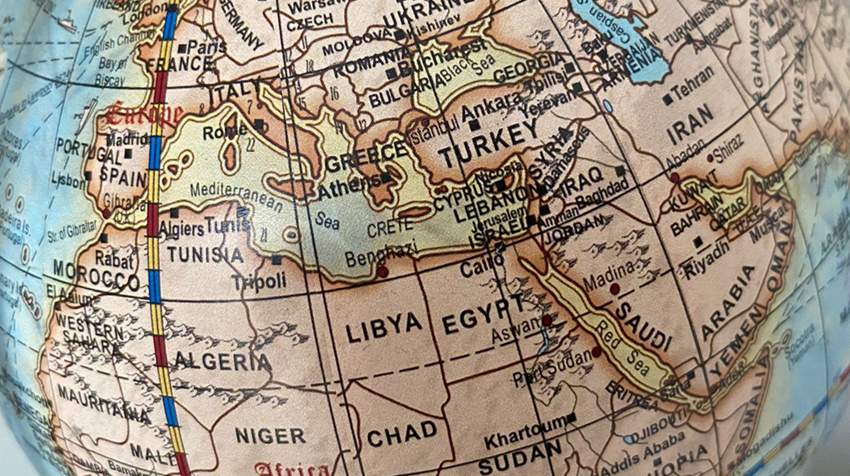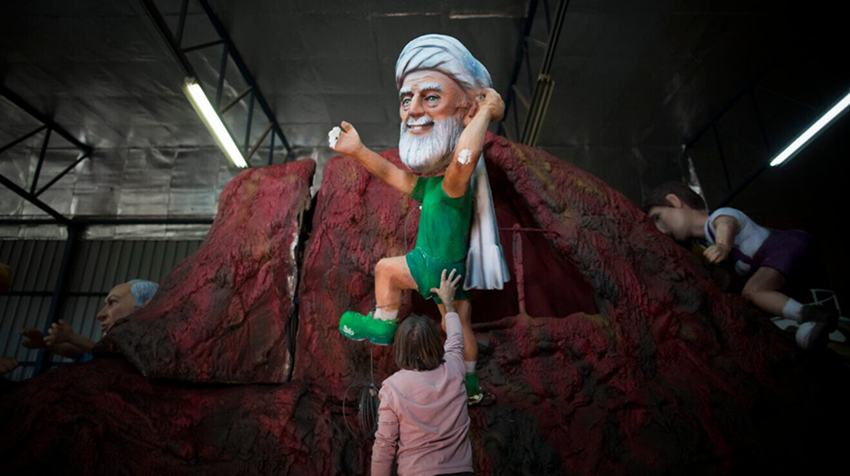Hamas supporters marching from Bank station to Trafalgar Square and Whitehall in London, Jan. 13, 2014. Photo by Erlend C. L. Birkeland/Shutterstock.
Ariel Kahana
Nothing seemed out of the ordinary last week in Stamford Hill, an ultra-Orthodox neighborhood in north London. Kosher stores played Purim songs, costumes were on sale just as they are every year, mothers pushed strollers just like in Bnei Brak, the ultra-Orthodox enclave alongside Tel Aviv, and boys wearing wigs made their way to the Talmud Torah schools.
But underneath the semblance of normalcy, something had changed, something had broken. Ever since Hamas committed crimes against humanity on Oct. 7, the democratic foundations of the United Kingdom have been shaken. At the same time, and there is a direct connection, the Jewish community has been under threat in a way not seen here since the Middle Ages.
“There is a growing threat to British democracy,” Prime Minister Rishi Sunak said in early March, speaking before the Community Security Trust (CST), an organization that provides security for British Jews.
“It is hatred pure and simple. An assault on the Jewish people. Here in this country, in this century and I tell you tonight: We will fight this antisemitism with everything we’ve got,” Sunak declared.
To address the two, interrelated, challenges, Sunak announced two high-budget plans: one to provide security for elected U.K. officials and the other to upgrade the protection of Jewish institutions. The plans are in their early stages, and time will tell how effective they will be.
Until then, both the Jewish public and politicians are adapting to the new situation. “My son knows that being yelled at on the underground may become part of his journey to school and back,” said Shira Joseph, program director at a community charity.
Q: How old is the child?
“Eleven.”
We meet at a downtown Starbucks. While the subject we are discussing is loaded, the atmosphere is calm, and unlike other interviewees I meet, Joseph does not whisper or hide who she is.
“My family has experienced several incidents. People shouted at me: ‘Free Palestine.’ People cursed my husband on the train. Someone at the gym asked my daughter if she agreed with what Israel was doing, after seeing a Beitar Jerusalem [soccer club] symbol on her water bottle. I’m always looking behind my shoulder, and I’m not the only one. There is a lot of talk in the community about the possibility of making aliyah to Israel.”
As if that wasn’t enough, about three months ago, Joseph and her family experienced a terrifying event. The name of a family member, who immigrated to Israel and serves in the Israel Defense Forces Spokesperson’s Unit, was published in one of the unit’s statements.
Minutes later, an account on the social media network X revealed his address in London. A video was uploaded with an image of the man’s London home and the following words: “Family X [name withheld here] are white supremacist terrorists, who are a danger to us here in London. A family terror cell that murders and rapes operates from this address.”
“I happened to be in Israel,” said Joseph. “The children were here at home. Thank God that nothing happened. No one came to protest or anything like that, but it was scary. We won’t let that break us. I told the children: Be proud of who you are, but don’t do stupid things either. My child walks around wearing a kippah.
“We’ve already complained to the police twice, and as a rule, I trust the authorities here. In fact, we are much more troubled by the situation in Israel. We did big fundraisers for Israel, and at the beginning of the war, many non-Jews came. Now the situation is reversed. Today, a majority points an accusing finger at Israel because of the number of fatalities in Gaza. But we fight back and stay strong.”
“No-go zones for Jews”
The experiences Joseph describes are reflected in the data. There has been a 500% jump in the number of antisemitic incidents in the U.K. since the start of the Gaza war.
These have included smashed windows, offensive graffiti, verbal attacks and “no-go zones for Jews”—referring to the huge “pro-Gaza” demonstrations held in London’s city center every Saturday. Were an Israel supporter to show up there, he would be putting his life at risk. Jews do not show up there.
A couple of months ago, in an event that was seen almost as sacrilegious, pro-Palestinian demonstrators screened onto the landmark Big Ben clock tower the slogan “From the river to the sea, Palestine will be free.”
Britain’s Jewish community was outraged, explaining that the slogan refers to the elimination of Israel. Sunak condemned the act and since then there has been no repetition, but the trauma has certainly been seared into the Jewish community’s consciousness.
Unlike Germany in the 1930s, here the establishment is fighting the pervasive hatred of Jews. But quite a few people think that this “awakening” to the situation, both for Jews and for the British themselves, is too little too late. The British government has lost its ability to ensure the independence and security of elected officials and members of the Jewish community.
In the course of my research for this article, three public figures with whom I met said they feared for their physical safety. They are elected officials and media commentators who have received direct threats from opponents of Israel, or who have been warned of the danger to them by local security organizations.
In some cases, Iranian proxies are involved in these threats. As a result of the threats against them, these people lowered their profiles, greatly reduced the number of interviews they gave in the British media, and took steps to conceal their home addresses online, for fear that they or their families would be physically harmed.
Queers for Palestine
Another illustration of the personal pressure exerted by the “extremists,” as they are called here, is the demonstrations that have been held every Friday night for the past four months in front of the home of Israeli Ambassador Tzipi Hotovely. Although London has been a difficult post for Israeli diplomats for decades, regular demonstrations in front of the ambassador’s residence, like in Cairo and Amman, cross a red line.
The situation has become so grave that supporters of Israel find it very difficult to state their position. Many, as mentioned, stay well away from the media arena because of the threats. The few who are willing to speak up usually encounter a hostile interviewer, posing questions such as, “Why is Israel starving Gaza and why has it killed 30,000 people, among them babies?”
The British government is influenced by media pressure and the Foreign Office is pushing for an arms embargo on Israel, as Canada imposed. The Israeli embassy and Israel’s supporters are waging a battle to contain the situation, with some success.
Meanwhile, the threats made by Israel-haters are not just empty rhetoric. In October 2021, a British man of Somali descent murdered Conservative MP David Amess, who was a supporter of Israel.
The murderer, Ali Harbi Ali, a “soldier of the Islamic State,” as he called himself, had previously targeted another Conservative MP, Mike Freer.
Now, 14 years after he was first elected to Parliament, Freer, openly gay and a staunch supporter of Israel, who is not Jewish, is abandoning public life as he fears for his life and his family.
Freer has always been threatened because of his support for Israel, but in December words turned into actions when his constituency office was set on fire.
“That was the straw that broke the camel’s back. I have been subjected to personal attacks, I have been attacked in my car, in the office, I have been threatened and cursed. I wear a stab vest at public events, but now my family is paying the price and scared, so we decided enough is enough,” said Freer.
He stressed that he has not changed his views: “My replacement also supports Israel, but maybe now we will have some quiet. What amazes me is the progressive circles that support Hamas. I asked the Queers for Palestine people, ‘What world do you live in? Do you support Gaza? I’ll pay for you to go there; we’ll see how long you can walk there as freely as you can here or in Tel Aviv.'”
Q: If a member of Parliament is murdered for his opinions, and another is forced to step down because of threats, what does that say about British democracy?
“Britain has always been a vibrant place, but I agree with the prime minister that the protests are being exploited to diminish our democracy. Some of the people participating in the demonstrations support the establishment of an Islamic Caliphate,” said Freer.
“What has changed is the silencing of parliamentarians, the ability to conduct debate. There are no more nuances, everything is black and white. You see, I support the two-state solution, but the situation is that if you don’t support Hamas, it means you’re against the Palestinians.”
Freer—and he is not the only one—attributes much of the toxic atmosphere against Israel and Jews to social media. “I don’t want to sound conspiratorial, but someone has an interest in undermining democracy, and whoever they may be, they are investing a lot of money in these networks.
“Perhaps China, or Russia, or Iran. Most people under the age of 35 get their information from social networks, and they don’t bother to check whether the information is true. Hamas has no qualms about spreading false information, while Israel is a responsible country that needs to check and verify facts, and this takes time.”
Q: What then do you think the future holds for the Jewish community in Britain?
“I’m not Jewish, so it’s not easy for me to say, but when there’s a conflict in the Middle East, there’s always an increase in incidents. There are many Jews in my constituency and I can only offer my sympathy.
“Without a doubt, there is a problem, and we cannot just say, ‘Everything is fine.’ While there are certainly problematic areas, I think Britain is still a good place for Jews.”
Freer will soon step down from the political stage. His departure in the wake of violence and threats should have shaken the U.K. to the core, but to the outside observer at least it appears that the British, as usual, are unfazed.
The authorities have, however, begun to take action. In extreme cases, there have been arrests and indictments. There is a lively public debate about what anti-Israel protesters should and shouldn’t be allowed to say. Boundaries have been drawn. But given the number of events and their intensity and content, this looks like no more than sticking a finger in the proverbial dam.
“Israel murders babies” and “Israel commits genocide” are utterances hurled countless times at those who walk around wearing a Star of David or other telltale symbols, I am told by members of the pro-Israel organization StandWithUs in the Finchley district of north London. Not coincidentally, there are no exterior markings on its offices.
Annie, a psychology student at the University of St Andrews in Scotland, shares some of her experiences over the past six months: “Someone tried to rip a necklace with a Star of David off my girlfriend’s neck. Eggs were thrown at Jewish students.
“The initial response of the rector, who was elected to her position last November, was to send an email to all students and faculty with accusations that Israel was committing war crimes. She participates in all pro-Palestinian protests but she won’t come to any of our events. Complaints from Jewish students have gone unanswered,” Annie reported.
Similar stories are told by students from other universities, such as Daniel from Leeds University and Rafi from City, University of London. Both are considering making aliyah at some point as they do not see a safe future in the U.K.
But their experiences pale next to those of Israelis Zacharia and Nava Deutsch, who were forced to flee their home in Leeds with their children. Rabbi Deutsch is a chaplain at the universities of Leeds, York, Hull, Huddersfield, Bradford and Sheffield.
When the war began, he returned to Israel for reserve duty and did not hesitate to post videos of himself in IDF uniform. When he returned home, he was greeted by hundreds of “demonstrators” who threatened him and his family with rape and murder. They have been living in hiding ever since.
Just the beginning
Isaac Zarfati, director of StandWithUs UK, refused to leave these incidents unaddressed. He initiated two urgent hearings in the House of Lords, where the students who were attacked testified. He has sent several letters demanding answers from the heads of academic institutions.
His assertive line has been shared only by an organization called the Campaign Against Antisemitism, which initiated a huge rally in support of Israel and, contrary to the official Jewish establishment, exposed attacks on Jews and supporters of Israel.
“The madness here is fraying British democracy at the edges,” said Zarfati. “Because of a war 4,000 kilometers from here, which does not affect the average British citizen, the speaker of Parliament is almost ousted and slogans are projected on Big Ben. This is a rape of British democracy. The system is being imploded. The establishment is beginning to wake up, but they are 20 or 30 years late.”
Zarfati’s days and nights are devoted to pro-Israel advocacy, from lesson plans in schools and a booklet explaining the legal justifications for the war to social media, where millions of Britons are exposed to content that is difficult to convey in traditional local media.
Zarfati’s pessimistic prediction is shared by freelance journalist David Collier, who has spent years researching hostile organizations in Britain. His research has included infiltrating the ranks of these organizations over the past decade.
“I think that a generation from now, the Jewish community in the U.K. will look completely different. Ultra-Orthodox pockets will remain, but people like me, Zionists and the non-religious, will have no place. Because our options are to fight, which is hard; or put your head down, as the Jewish establishment does; or leave, as quite a few people have done,” said Collier.
“The reason for this is that the British establishment does not want to recognize the severity of the problem created here by the Muslim minority. It is easier for it to push the Jews aside. I think that in the end there will be an internal civil conflict between the British and Muslim extremists.
“The Jewish community will see an increase in violence against it. There will be more attacks on synagogues, schools and kosher cafés. British governments have made the mistake of embracing the radicals, thinking that they could moderate and educate them; this is absolutely a mistake,” he said.
Collier and others present this writer with more and more examples and complain about the depth of silencing and the violence employed by Islamists, not necessarily against Jews. Collier intends to return to Israel, where he lived in the past.
The British Jewish establishment admits that there is a problem, but in contrast to the bleak future presented by Zarfati and Collier, believes things will be all right.
“Yes, I’m worried,” said Stuart Polak, a former Conservative MP and long-time director of the Conservative Friends of Israel, and since 2015 a life peer of the House of Lords.
Since the outbreak of the war, Polak has devoted himself full-time to Israel’s cause. He is aware of the problems, works to minimize damage vis-à-vis senior British government officials, and has assisted the families of Israeli hostages on their trips to the U.K. Speaking at the House of Lords in Westminster, he said that despite the difficulties, all is not lost.
“I don’t want to sound too harsh, but there are difficulties. However, Israelis can perhaps understand better than others that not every clip posted on social media reflects reality. The window of a kosher store may have been smashed but it happened one time in one place. It is not something that happens all the time.”
Q: Nevertheless, you have said that you are concerned.
“Because there are problems. People raise questions about their safety and their future here, and that includes people in my family. The problem is that the vocal minority, which is responsible for the demonstrations and sets the tone, does not behave according to values of understanding, tolerance and the ability to get along together. So, the situation is definitely the hardest it’s ever been, but it’s not lost,” asserted Polak.
Lord Ian Austin does not take the challenges lightly. Speaking in the House of Lords, he said: “Members of Parliament who are scared or threatened, who are influenced by calls for genocide that are heard outside Parliament or who are forced to leave office—these are serious problems, and totally unacceptable. To hear that Jewish children take off their yarmulkes on the train because they are scared is heartbreaking, and it must not happen. The attacks on Jewish students are also shameful.”
Austin, the adopted son of a Czech Jew who came to the U.K. as a 10-year-old in 1939, quit the Labour Party in 2019 because of the antisemitism of Labour leader Jeremy Corbyn and has since declared himself an independent.
Q: Does the Jewish community have a future here? Many younger Jews are talking about aliyah.
“I can’t think of a United Kingdom without Jews,” responded Austin.
Source: JNS - Originally published by Israel Hayom.


































